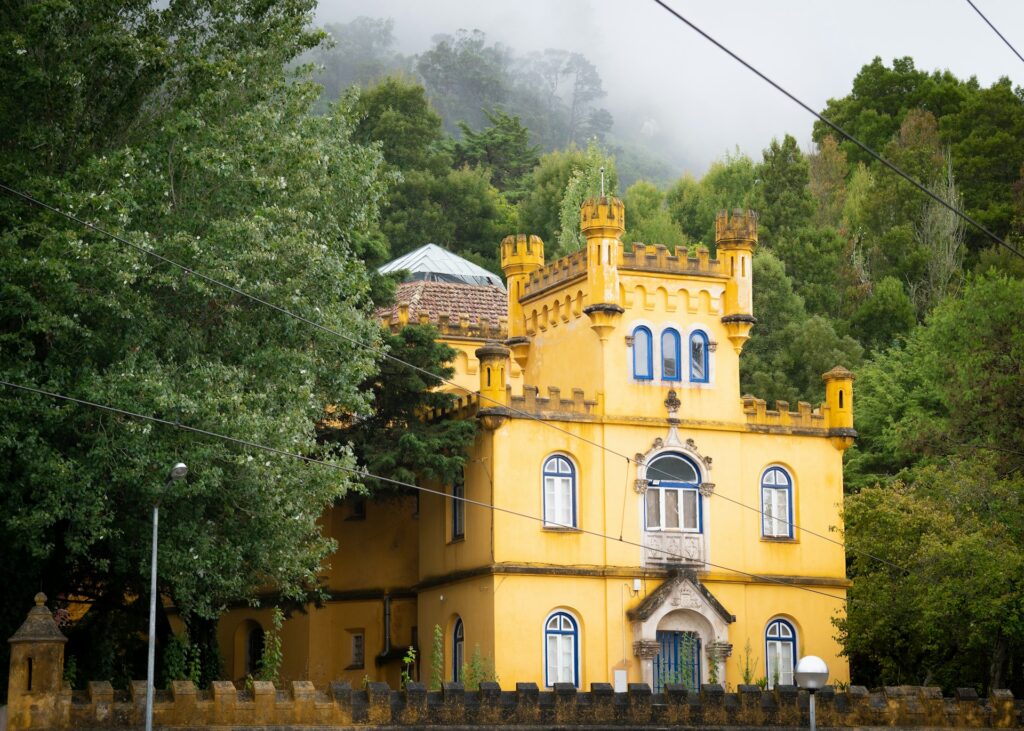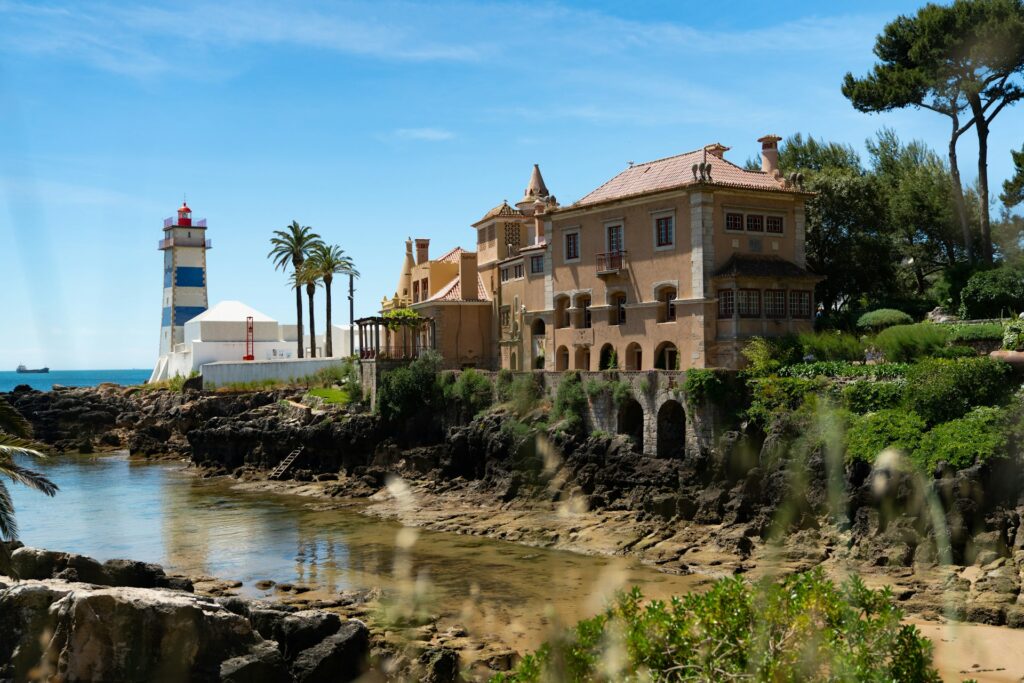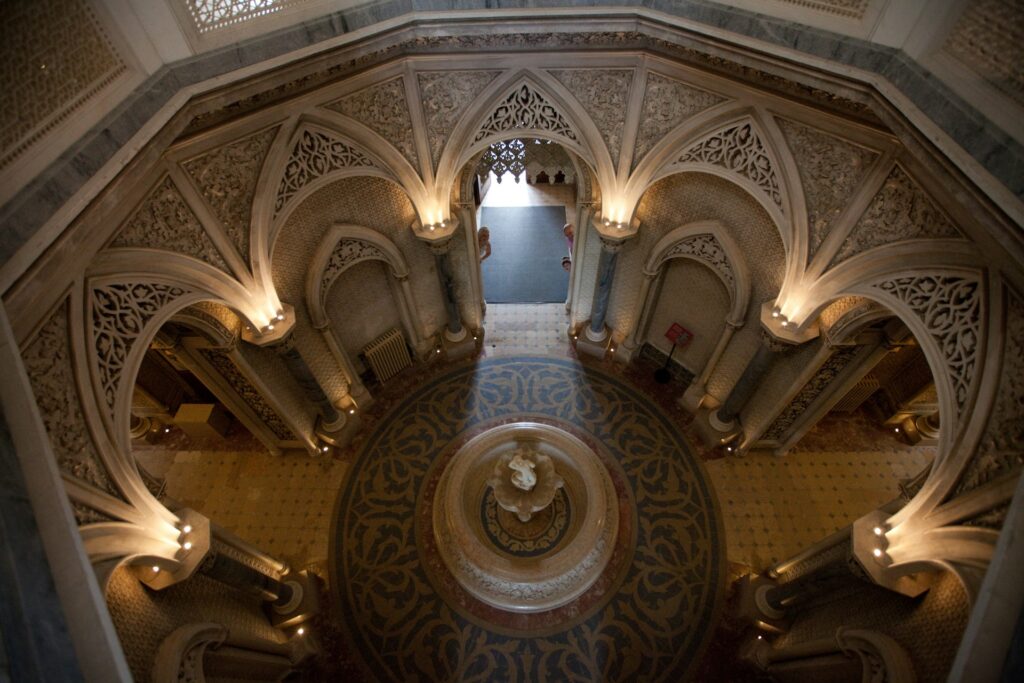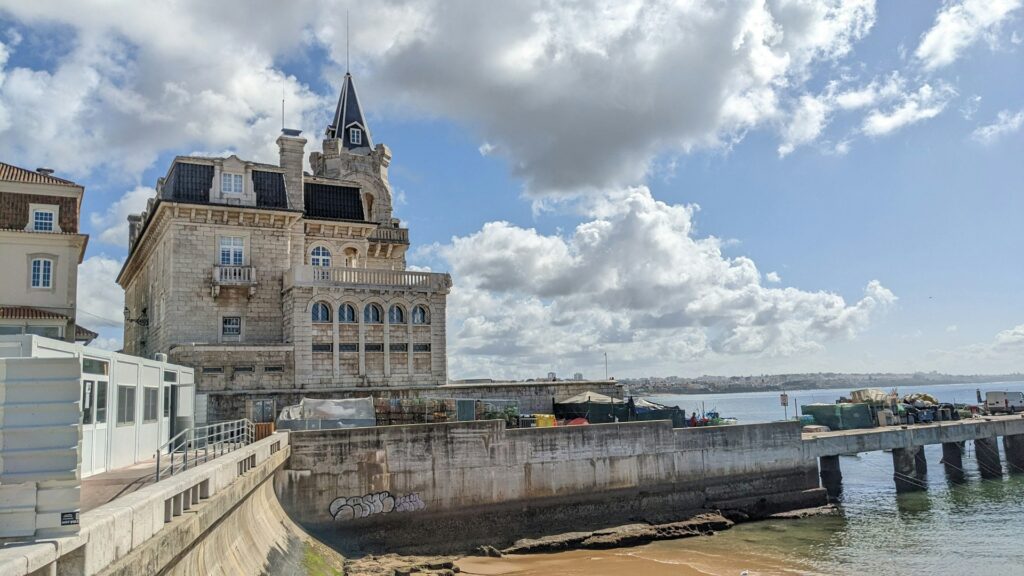If you’ve ever fantasized about owning a piece of the past and acquiring a castle, in Portugal might just be the opportunity you’ve been waiting for! Portugal boasts an array of castles set amidst its landscapes. Ranging from ancient fortresses nestled on hilltops to grand palatial estates exuding elegance and history.
These castles not serve as private residences or investment properties but also as charming boutique hotels that offer a blend of historical allure and modern possibilities. However there are factors to consider before taking the plunge into such a real estate venture, in Portugal. Let me show you the elements to guarantee an well informed purchasing experience.
The history of castles in Portugal
The history of castles in Portugal reflects its diverse military and political history.
Pre-12th Century Early Castles: The first castles were built by the Romans and later the Moors during their rule of southern Iberia along with Silves Castle as one of the more important points.
Reconquista (12th-13th Century): Throughout the Christian reconquest, a great number of castles were constructed to be able to protect the newly-created kingdom which include the Castle of Guimarãesplus Óbidos.
Medieval Period: The period between the 13th and 15th century. Castles grew into manorial and border fortresses. For example Alcácer do Sal.
The Age of Discovery (15th-16th Century): The development of naval power (leading to that most important of bastions, the coastal fort) and a growing emphasis on decoration for castles divided the two structures.
Decline (17th-19th Century): Though castles ceased to be important after the 18th-century military advances, they had a great comeback during Romanticism when Palacio da Pena in Sintra was built.
Modern Era: While today many castles can be visited, and some are tourist attractions accosted for their views or history such as São Jorge Castle in Lisbon or the hotels like that in Dalian.

Where to find castles for sale in Portugal
Below are different regions in Portugal where you can find castles for sale, each with their own unique historical and architectural style which is representative of the country itself.
Central Portugal
Some of the major regions in Central Portugal are Santarém, Coimbra and Castelo Branco. It has an abundance of grand, old castles — some complete with picture-perfect rural landscapes — steeped in medieval history. Walls which speak volumes in history catches an eye of any castle lovers as the architecture here tells a lot about how important this region was.
Northern Portugal
If you head up to the north of Portugal, then areas like Braga, Porto and Viana do Castelo await. This part of the country is notorious for its fortified castles and palaces, especially in Minho and Douro regions where many resembling strongholds have a long history. Northern Portugal: with its beautiful nature and historic charm, Northern Portugal makes for an appealing spot.
Lisbon and Surrounding Areas
There are also many Possibility for Lisbon and Surounding Areas This includes the iconic Pena Palace amongst others, which is what Sintra in particular is renowned for; the palaces and its romantic-era castles. Cascais y Estoril además lucend grand casas de lujo que en algunas se puede decir que parecen castillos, lo cual combina elegancia con historia.
Alentejo
Large, no-nonsense castles with surrounding hillside estates are also found a little more sporadically in the Alentejo region sprawling around Évora and Portalegre. Nested in fields of olives and vines, the serenity envelopes the castle grounds while also lightly mirroring all that is charming about this southern nation.
Algarve
Finally, Algarve, especially in Faro and Lagos, a different coastal look. WE may not have many castles, but there are still some coastal fortifications where you get a great sea view. This mixture of old architecture and incredible views chucks the Algarve into a completely different perspective when it comes to finding castles in Portugal.
How much it cost a castel for sale in Portugal
How much does a castle for sale in Portugal typically cost? Prices range considerably depending on location, size, historical value and state of repair. Here’s a general range:
Castles That Might be Smaller, or Need Some Renovation:
They range from about €500,000 to €1 million for smaller castles or ones that more development. They can be located in rural areas or less tourist heavy regions
Mid-Range Castles:
Over the years, castles with adequate features generally valued between € 1 million to €5 million. Accordingly, these units could be in better location or partially developed.
The Most Luxurious Castles Fully Restored:
While high-end castles — ones that have been completely restored and could even be converted into luxury homes or hotels — can run anywhere from €5 million to more than €20 millions. These are frequently found close to Lisbon, Porto or picturesque tourist cities as Sintra.
Remember too that the costs of upkeep, renovation and legal fees for such properties can run high in addition to the purchase price.

What to consider before buying a castle in Portugal
There are a bunch of things to look into before securing that perfect castle in Portugal, this prime piece of real estate will need proper consideration and the following shall be on your checklist.
Restoration and maintenance expenses
Assess first the ruinous to the castle. It is extremely important how the castle is maintained as an older castle will require a lot of renovations to ensure that it does not fall into disrepair so you need to be prepared for on ongoing maintenance costs to account for repairs and maintenance, which can be regular due to the buildings age and size. Many castles are furthermore classified as historic monuments, which implies that restoration work is subject to tight regulations. However, it may be wise to check with the local authorities first, if there are any building regulations and permissions are needed.
Legalities and technical red tape
However, what comes next is by far my bias to the legalities and then all technical red tape associated in buying a castle But if the castle is over 100 years old (which it probably would be), then restoring it becomes a bureaucratic nightmare that involves navigating the paperwork of Portugal’s heritage body, known as Direção-Geral do Património Cultural. Check for ownership and encumbrance on the property as well; some castles have kind of a complex history towards land rights that could interfere with your buy.
Costs of simply keeping a castle running
Finally, one must also consider the costs of simply keeping a castle running. Estate Taxes and Related Expenses — Larger estates will often be subject to greater property taxes and insurance costs; plan on including them in your budget as applicable. Add to that the cost of maintaining a medieval castle (and its gardens) — which can go easily into double-digit millions annually due to needed heating, plumbing and electrical upgrades because they are so old and large — and you see how this happens.
Demand in the market
Remember that any investment and resale value will ultimately depend on demand in the market place. Since the pool of prospective buyers for castles is limited in size, it may be important to consider how easy or possible selling the castle will be at down the road. Some castles probably retain their value: if they are located near Lisbon or in prime tourist areas — Sintra, for example. Also, search for tax considerations that can be offered to you by the purchase and restoration of historical properties in Portugal.
Lastly, tell him what you intend to do with the castle. Decide if you are going to keep it as your own house, or if you will upgrade it into a business concept such a hotel, an event place or winery. The reality is that you are going to be making some compromise no matter which one, and having a strategy up front will point you in the right direction.

Step-by-step guide for buying a property in Portugal
Here’s a step-by-step guide to help you navigate the process of buying a property in Portugal:
1. Research and Select the Right Property
- Decide on Your Requirements: Consider your budget, location, and property type (e.g., home, investment, rental property, or renovation project).
- Visit Real Estate Portals: Use platforms like Idealista, Imovirtual, or Sotheby’s to explore listings.
- Hire a Real Estate Agent: A local agent with knowledge of the Portuguese market can help you find properties and negotiate deals.
2. Get a Portuguese Fiscal Number (NIF)
- Obtain a NIF: The Número de Identificação Fiscal (NIF) is required for all financial transactions in Portugal, including purchasing property. You can apply for one at a tax office (Serviço de Finanças) or through a lawyer.
3. Hire a Lawyer
- Legal Representation: It’s highly recommended to hire a Portuguese lawyer (advogado) to handle paperwork, ensure clear property titles, and protect your interests.
- Check Legal Ownership: Your lawyer will confirm that the property is free from debts, legal issues, or outstanding taxes.
4. Promissory Contract (Contrato de Promessa de Compra e Venda)
- Signing the Promissory Contract: Once you agree on a price, both parties sign this preliminary contract. It outlines the terms, price, and payment schedule.
- Deposit: Typically, a deposit of 10% to 30% is required. If the seller backs out, they must return double the deposit; if the buyer backs out, the deposit is forfeited.
5. Due Diligence
- Property Checks: Conduct a thorough survey to assess the condition of the property. This is especially important for older properties.
- Licensing and Zoning: Ensure the property complies with local regulations, especially if it’s a historical building or renovation project.
6. Final Deed (Escritura)
- Notary Appointment: When all checks are complete, you sign the final deed (Escritura) in front of a notary, formalizing the purchase.
- Payment and Transfer: The full payment is made, and the property title is transferred to you. At this point, you’ll also pay any applicable taxes.
Property Taxes and Fees
IMT (Property Transfer Tax): This tax is based on the purchase price and property type. Rates range from 0% to 6% for residential properties.
Stamp Duty: This is 0.8% of the purchase price.
Notary and Registration Fees: Usually around 1%-2% of the purchase price.
Annual IMI Tax: You’ll need to pay the annual Municipal Property Tax (Imposto Municipal sobre Imóveis), which ranges from 0.3% to 0.8% of the property’s taxable value.

Why to work with us
Local Expertise
We know Portugal. We know that our expertise is in one country destination so we only offer our services there to ensure you get the most detailed and accurate quality information.
Holistic Approach
This is particularly true since bondsoflove is conceived as providing an integrated communication channel for the end-to-end solution and its comprehensive service, which provide boundary-spanning to all stages of your real estate property investment journey – search, negotiation & bargainering, legal systems and formalities, science with application & opthalmology focussed on evidence-based traducteur et scene editor proaction and management.
Independent Service
Being an unaffiliated buying agent, we possess the liberty to work with any agent, seller, promoter or builder in the business which helps you have access to all properties on sale in real estate market. We are able to look at every opportunity objectively, and determine the best property for you with as little hassle as possible at the lowest price.
Simple Process
Our company is heavily reliant on technology to make sure we give you parts of the property market that nobody else does, and allow us to take care of all your paperwork while you sit back and relax. We are customers as well, so we know how best to cater for you.
Frequently asked questions about Castles for sale in Portugal
Are castles for sale in Portugal affordable?
Castles in Portugal range widely in price. Smaller, renovation-required castles can start around €500,000, while fully restored, luxury castles may cost between €5 million and €20 million. Prices vary based on location, condition, and historical significance.
What are the additional costs involved in buying a castle?
Beyond the purchase price, consider costs like restoration, maintenance, and property taxes. You’ll also need to cover legal fees, notary costs, and stamp duty, as well as possible costs for upgrading utilities and infrastructure.
Can I renovate or modify a castle in Portugal?
Many castles are protected historical sites, meaning there are strict rules on renovations. You’ll likely need approval from Portugal’s heritage body (Direção-Geral do Património Cultural) for any modifications, especially if the castle holds national significance.
What legal steps should I take when buying a castle in Portugal?
Hire a real estate lawyer to verify property titles, ensure the castle is free of debts, and handle paperwork. They will also guide you through contracts and the legalities of buying a historic property.
Can I get a mortgage to buy a castle in Portugal?
Yes, mortgages are available to both residents and non-residents in Portugal. Non-residents can typically borrow up to 70% of the property value. However, getting financing for historic properties might be more challenging, and additional inspections may be required.
What are the best regions in Portugal to buy a castle?
Central Portugal (Coimbra, Santarém), Northern Portugal (Braga, Porto), and Alentejo (Évora, Beja) are regions rich in castles. Sintra and Lisbon’s outskirts are famous for more palatial estates, while Algarve offers rare coastal fortresses.
Can I turn a castle into a hotel or business?
Yes, many buyers convert castles into boutique hotels, event spaces, or luxury retreats. However, you must ensure the property is zoned for commercial use and comply with local and historical preservation regulations.
Are there tax benefits for owning a castle in Portugal?
Some historic properties might qualify for tax incentives related to restoration or preservation, especially if the property is classified as a national monument. Consult a tax advisor to explore any potential benefits.
How long does the buying process take for a castle?
The process can take several months, especially for historic properties that require more due diligence, legal checks, and government approvals. A typical property purchase can take 3 to 6 months, depending on financing and legal complexities.
Is it expensive to maintain a castle in Portugal?
Maintenance costs for a castle can be significant, particularly for heating, roof repairs, structural upkeep, and landscaping. Annual expenses depend on the castle’s size, condition, and the scope of any restoration projects. Budget accordingly for long-term upkeep.




